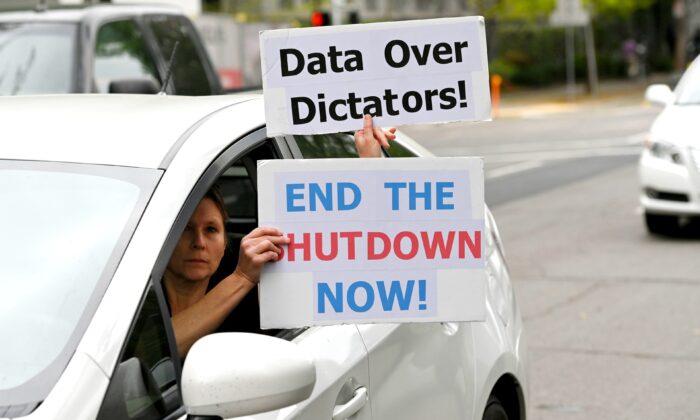Dozens of business interests in California are opposing Assembly Bill 2751, which would allow employees to ignore after-hours communications from employers.
Authored by Assemblyman Matt Haney, the measure would also impose civil penalties with fines of at least $100 per occurrence if patterns of behavior of such are identified through complaints filed by workers.
“One should wonder where and how this bill originated,” John Kabateck, California state director for the National Federation of Independent Business—a nonprofit, nonpartisan association advocating for small businesses nationwide—told The Epoch Times April 22. “It’s either from an author who is completely out of touch with the reality of small business owners and workers in their own backyard, scheming attorneys seeking to make a quick shakedown, or a little bit of both.”
He took exception to what he described as a lack of clarity in the bill’s language.
“This bill is extremely vague and difficult to interpret,” Mr. Kabateck said. “It is a ridiculous policy that we are confident, with no support to date, that the Legislature will reject.”
The measure’s clause that restricts contact except in emergency situations is a key sticking point for opponents. It defines such as an “unforeseen situation that threatens an employee, customer, or the public; disrupts or shuts down operations; or causes physical or environmental damage.”
Mr. Kabateck argued that such would invite litigation and unnecessarily limit employers’ ability to communicate with staff members.
“The bill’s definition of emergency is subject to an extraordinary amount of interpretation,” he said. “Those definitions give employees room to argue that before interrupting them after hours an employer better be able to demonstrate that a catastrophic event will occur.”
Noting the need for flexibility given the oftentimes unpredictable nature of business operations, he highlighted the failure of many small businesses during the pandemic that failed to navigate the complexities of shifting policy guidelines emanating from state and local governments and said more such business losses would materialize if the bill becomes law.
“To keep businesses humming along, at times it’s important for employers to reach out to employees outside of the regular nine-to-five or standard workday,” Mr. Kabateck said.
Recognizing the importance of a work-life balance, he suggested the bill is unnecessary because employers must prioritize keeping employees satisfied to stay competitive in the tight labor market in California and thus are not likely to take advantage of workers’ after-hours.
Chambers of commerce from across the state, including the California Chamber, also wrote the Legislature in opposition to the bill—arguing that the measure is a roadblock to success for the state’s economy.
“The bill will effectively subject all employees to a rigid working schedule and prohibit communication between employers and employees absent an emergency,” the coalition of opposition said in Legislative analyses. “This blanket rule is a step backwards for workplace flexibility.”
The groups expressed concern that the bill ignores existing labor laws, is too overbroad, and would impact the ability of some businesses and government offices to operate efficiently.
“It fails to consider California’s long-standing laws regarding hours worked, exempt employees, and fails to account for the uniqueness of different industries and professions,” opponents said.
“It would prevent the Governor and State agencies from contacting their staff outside of normal work hours, which would lead to basic functions of the state being imperiled.”
Additionally, opponents suggested the measure would disincentivize prospective employees from applying for positions in lawmakers’ offices due to exemptions that exclude Legislative staffers.
Workers in all industries could be subject to lower wages, as overtime hours would potentially be limited by the bill because such hours are not often pre-planned, and the text of the measure fails to outline rules regulating work-hour changes.
“That would result in significant lost wages for workers who regularly want to work overtime,” a coalition of opponents wrote the committee in opposition in a letter shared with The Epoch Times. “The only way to seemingly work around this issue would be to set a working hours schedule that is more than the employee’s usual shift just in case they ever need to work later.”
More than five dozen groups are listed in the Legislative analysis as opposing the bill, while no groups offered comments of support for lawmakers to consider.
The bill’s author argued that the measure is necessary to protect workers from employers and that a surge in work-from-home environments exacerbated the need for such guidelines.
“Many people will tell you that they have felt pressure to work while not being paid, or respond to workplace communications while they were off,” Mr. Haney said in a legislative analysis. “The cultural shift to working from home and the use of smartphones has made many employees feel like they are tethered to the office—even if they are at home.”
He said the bill would prove mutually beneficial for all parties.
“This isn’t changing any time soon and we need to recognize that employees are happier and more productive when they are able to completely disconnect from work during their non-working hours,” Mr. Haney said. “This type of policy not only benefits workers, but also employers who are looking to retain employees long term.”
AB 2751 passed the Assembly’s Labor and Employment Committee April 17 on a 4–2 vote and will next be heard by the Appropriations Committee on a date yet to be determined.







